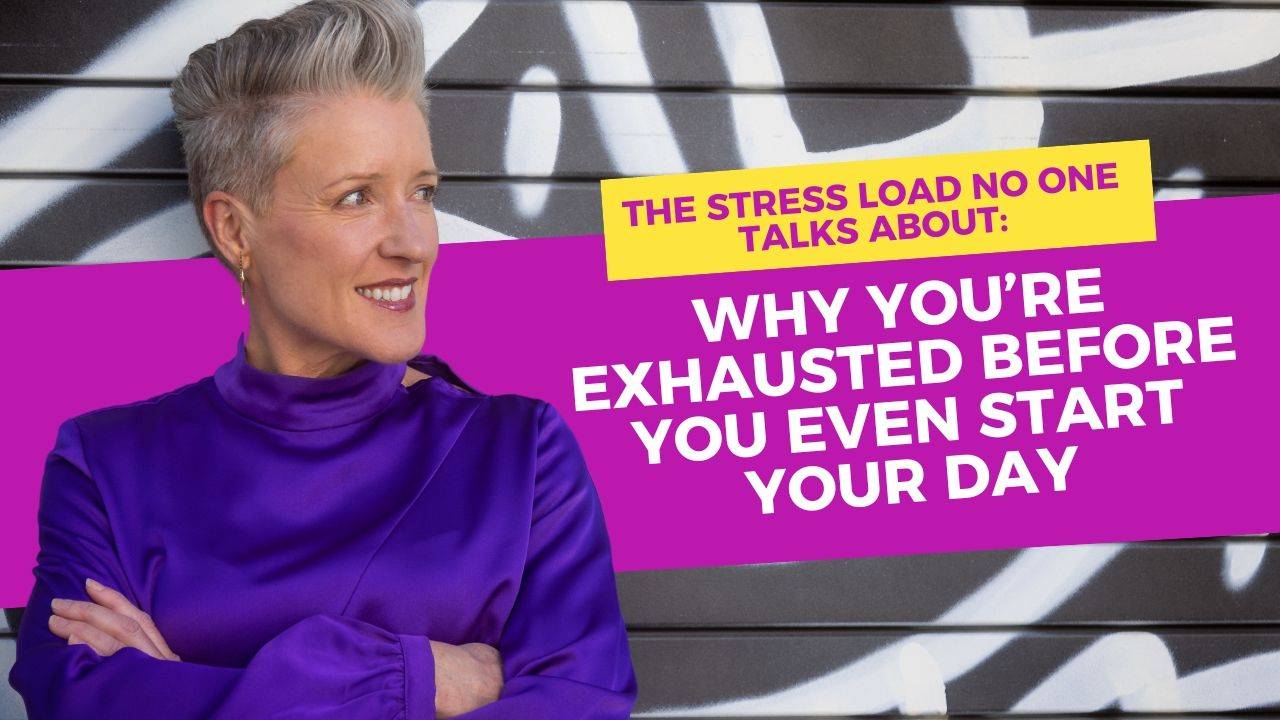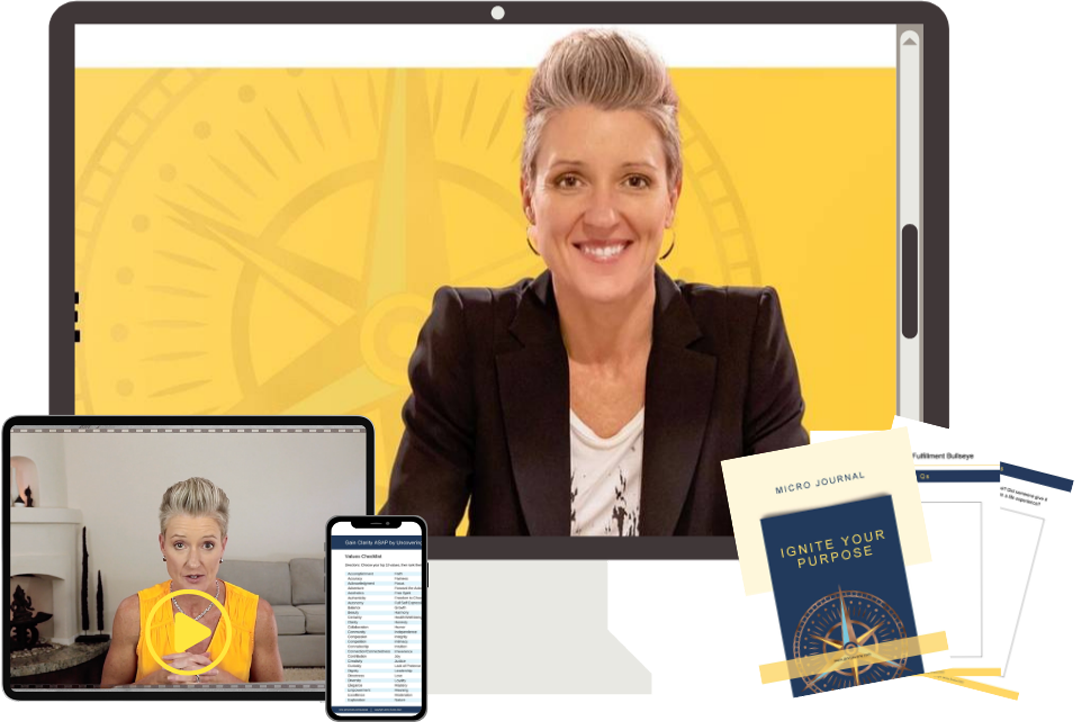The Stress Load No One Talks About: Why You’re Exhausted Before You Even Start Your Day
Apr 22, 2025
WHY YOU’RE RUNNING ON EMPTY BEFORE 9 AM
Before you even get out of bed, your brain is already racing:
Did I respond to that email?
What’s for dinner?
That bill is due today.
Do I have time for a workout?
What time is that meeting?
And just like that, before your first sip of coffee, you’re already drained.
Stress isn’t just coming from your inbox—it often starts before the day even begins. High achievers push through, telling themselves they’re handling it, but the truth? You’re operating at a deficit before the workday even starts.
This isn’t about strength. It’s about recognizing that you’re carrying way more than you should be.
PART 1: THE UNSEEN STRESS LOAD—WHY YOUR BRAIN IS OVERLOADED BEFORE BREAKFAST
High achievers have a special talent: handling a ridiculous amount of responsibility.
And that’s exactly why stress is so sneaky.
It doesn’t always feel like overwhelm—it just feels like life.
But here’s the problem: Stress doesn’t always hit all at once. More often it seeps in through thousands of tiny, daily stressors—slowly draining you without you realizing it. It becomes your baseline, making exhaustion feel normal. Over time, this constant, low-level pressure impacts everything—your focus, energy, and even your sense of self.
THE 3 LAYERS OF STRESS NO ONE TALKS ABOUT
1. Micro-Stressors: The Tiny Energy Leaks You Ignore
These are the little things that shouldn’t be a big deal… but add up fast.
Decision fatigue (What’s for dinner? When’s the next dentist appointment?)
Managing everyone else’s schedule (kids, partner, aging parents, coworkers)
The never-ending notifications, emails, and messages
The mental checklist of all the things that need to get done
Each one is small. But together? They pull your attention in a thousand directions—leaving you frazzled before your actual workday even starts. By the time you sit down to focus on real priorities, your mental energy is already spent.
2. The Emotional Load: The Invisible Pressure of Being ‘The Responsible One’
If you’re the person everyone depends on, you carry stress differently.
Supporting friends, family, and colleagues—often at your own expense
Feeling like you should be able to “handle it all”
The constant self-judgment of whether you’re doing enough
This type of stress isn’t just about logistics—it’s about expectations. You’re not just managing tasks; you’re managing emotions—yours and everyone else’s. You feel responsible for keeping everything running smoothly, making sure nothing falls apart. And even when you’re at capacity, you tell yourself, “I’ll just push through.”
3. The Identity Pressure: The Weight of Who You Are to Everyone Else
The go-to person at work
The dependable partner or parent
The friend who always has it together
When you’re known as the one who never drops the ball, stepping back feels impossible—even when you need to. Saying no feels like failing. Taking a break feels like letting people down. You’re not just overworked—you’re trapped by the expectations that come with your success.
This isn’t just mental fatigue. It’s full-body depletion. And the longer you carry it without relief, the heavier it gets. It affects your sleep, decision-making, and ability to experience joy. But because it builds so gradually, you may not even notice what it’s costing you—until you hit a breaking point.
PART 2: THE INVISIBLE TAX OF ALWAYS BEING ‘THE RESPONSIBLE ONE’
If you’re always holding everything together, who’s holding you?
High achievers rarely notice the stress tax they’re paying—it doesn’t hit all at once. Instead, it creeps in through exhaustion, brain fog, and feeling stretched too thin. You push through, telling yourself you’ll rest later, but over time, the cost of being “always on” becomes impossible to ignore.
THE HIDDEN COSTS OF CARRYING IT ALL
The Energy Tax: Your brain never stops, your to-do list never ends, and no matter how much you sleep, you wake up tired.
The Relationship Tax: When you’re depleted, patience disappears. Even time with loved ones feels like another demand, leaving you emotionally checked out—and guilty about it.
The Decision-Making Tax: Chronic stress clouds judgment. Instead of thinking strategically, you react. You overanalyze, second-guess, and struggle to trust your own choices.
SIGNS YOU’RE OVERLOADED BUT DON’T REALIZE IT
Snapping over minor things that normally wouldn’t bother you
Feeling numb or disconnected, even in moments that should bring joy
Constant mental racing, unable to focus on one thing at a time
Always feeling like no matter how much you do, it’s never enough
The biggest red flag? You feel guilty just thinking about slowing down. If rest feels like something you have to earn or stepping back makes you uncomfortable, that’s not just stress—that’s over-functioning. And it’s keeping you stuck in a cycle that’s costing you more than you realize.
PART 3: HOW TO RECLAIM ENERGY (WITHOUT DROPPING RESPONSIBILITIES)
Most productivity advice says, "Do less, take a break." But for high achievers? That’s not realistic. You have responsibilities. People rely on you. You can’t just walk away.
The solution isn’t doing less. It’s doing differently.
The most successful people don’t avoid stress—they manage their energy so it doesn’t drain them. Here’s how:
STEP 1: STOP HOLDING EVERYTHING IN YOUR HEAD
Your brain isn’t a storage unit. The more you try to remember, the more unnecessary stress you create.
Write it down. Capture everything swirling in your mind instead of carrying it all.
Automate decisions. Set up meal plans, auto-pay, and recurring schedules to reduce decision fatigue.
Brain dump before bed. Get thoughts on paper so your brain can actually relax.
If you constantly feel mentally overloaded, this is your fix.
STEP 2: IDENTIFY WHAT’S ACTUALLY YOURS TO CARRY
High achievers take on everything—but just because you can handle it doesn’t mean you should.
Ask yourself: If I don’t do this, will it actually fall apart? If not, let it go.
Pass the baton. Delegate before you’re drowning.
Drop the guilt. Expecting others to contribute isn’t failing them—it’s sustainable leadership.
Releasing unnecessary responsibility isn’t about slacking. It’s about protecting your energy for what actually matters.
STEP 3: SET UP YOUR OWN ‘CHECK ENGINE’ LIGHT
You don’t wait for your car to break down before getting an oil change. Don’t wait for burnout to recover.
Daily: A three-minute reset (coming in the next section) to clear your mind.
Weekly: A real recovery activity—reading, walking, meditation—not mindless scrolling.
Monthly: A non-negotiable break. A full weekend off, a no-work day, or a trip to disrupt your routine.
If you want to perform at your highest level, recovery isn’t optional. It has to be part of your routine, just like any other key responsibility.
PART 4: THE 3-MINUTE RESET THAT STOPS STRESS FROM RUNNING THE SHOW
Stress isn’t just mental—it’s chemical. It floods your body with stress hormones, tightens your muscles, and hijacks your brain’s ability to think clearly. When your nervous system is in overdrive, everything feels urgent, overwhelming, and out of control.
If you want to shift out of stress mode fast, you need a new input. The good news? You can reset in just three minutes.
THE 3-MINUTE RESET: SCIENCE-BACKED & HIGH-PERFORMANCE APPROVED
This simple method shifts your nervous system from fight-or-flight into clarity and control.
STEP 1: RESET YOUR BODY
Your body stores stress—tight shoulders, clenched jaw, shallow breath. The fastest way to clear your mind? Move.
Stand up. Movement tells your brain you’re not stuck.
Shake out tension. Stress accumulates in muscles—release it.
Take a deep breath. Oxygen signals calm, resetting your nervous system.
When your body moves, your brain follows.
STEP 2: BREAK THE ‘REACTION MODE’ LOOP
Stress makes everything feel equally urgent, forcing you into reaction instead of strategy.
Take a slow inhale, hold for three seconds, exhale longer than you inhale.
Ask: What actually matters right now? Will this matter 5 days from now? Five months from now? Five years from now? Stress clouds priorities—get clear.
Let go of what’s out of your control. Mentally list five things you can’t change and release them.
By shifting your focus to what is within your power, you stop the stress spiral.
STEP 3: CREATE MOMENTUM WITH ONE SMALL ACTION
Stress can paralyze you in overthinking or avoidance. The key? Move forward immediately.
Take one small, clear action—send the email, make the call, check off one task.
Shift from stress to progress. Small wins tell your brain you’re in control.
This reset won’t eliminate stress—it puts you back in charge. Instead of stress running your day, you shift your nervous system, reclaim your energy, and move forward with clarity.
YOUR ENERGY IS YOUR GREATEST ASSET—PROTECT IT
You are not exhausted because you cannot handle stress. You are exhausted because you are carrying too much, too often, without a reset.
Now you know:
Where stress is sneaking in before your day even starts.
How to release what is not yours to carry.
The science-backed way to reset your energy anytime, anywhere.
So here is the real question: Are you ready to stop being drained before the day even begins?
Your success is not about doing more. It is about managing your energy better. Let’s make sure stress is not running the show.


